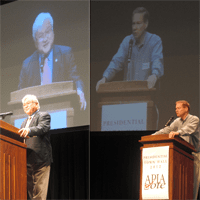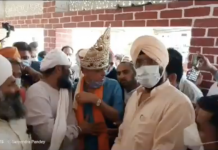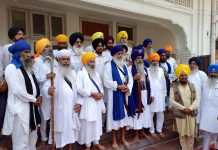


WASHINGTON— Representatives of the presidential campaigns last month addressed Sikh, Asian and Pacific Islander American issues at a town hall in Washington.
Congressman Michael Honda of California, congressional district vice chair for the Democratic National Committee and representing President Obama, reeled in Sikh viewers by stating: “When we say Asian American, AAPI, we know that we are all here together. So, to my brothers and sisters from the Sikh community, Sat Sri Akal.”
Former congressman Thomas Davis of Virginia, representing Mitt Romney, said, “It’s tragedies like that (theatre shooting in Colorado) that remind us that despite the sharp partisan difference sometimes, we really are all Americans, and at the end of the day we are on the American team.”
Former Massachusetts Governor Mitt Romney, the presumptive Republican nominee, also relayed his message via video. “We do not need higher taxes, more mandates or more red tape, we need pro growth and pro entrepreneurship policies that reward achievement,” he said. “Cut spending and balance the budget. As president I will get our fiscal house in order. We need to open up market for new goods, and as president I will promote fair and free trade. ”
Organized by the Asian and Pacific Islander American Vote and moderated by MSNBC anchor Richard Lui, the town hall was held on July 21 at the George Mason University’s Center for the Arts in Fairfax, Virginia. The Sikh American Legal Defense and Education Fund, a Washington-based advocacy group, was among the 36 organizations that sponsored the event.
“Our prime goal is to ensure that the Sikh American voice is represented to the campaigns as well as candidates across all levels of government,” said Navdeep Singh, SALDEF policy advisor, in an interview with SikhNN prior to the event. “We would like to see active engagement by the political campaigns and parties with the Asian American and Sikh American communities as part of the campaign process.”
Richard Lui, Toby Chaudhuri, co-chairman of APIAVote, and actress and APIAVote advisor, Tamlyn Tomita, gave the opening remarks. Honda and Davis were then asked questions that were predetermined by the organizers. The questions focused on issues of concern to the larger Asian American community such as jobs, healthcare, education and immigration.
Navdeep Singh posed the only Sikh question, directed at Honda. He asked about how work force investment and economic development programs that create jobs for the Asian community could also ensure that the community did not face discrimination.
“The Obama administration has increased jobs and career training programs for all of our AAPI (Asian American Pacific Islander) communities. Discrimination is one thing that will not be tolerated,” Congressman Honda responded.
The 1,500-seat venue at George Mason University was rather empty with less than 100 participants, 20 of which were from the Sikh community. Viewing parties were observed across the country by both Sikh American and Asian American Pacific Islander communities.
SALDEF initially announced in its news release that the presidential candidates would be present at the town hall, echoing a news release by APIAVote, the event organizer. Although subsequent news releases stated that campaign representatives would be debating at the town hall, many members of the Sikh community were expecting Obama and Romney at the event.
“This is very typical of this type of event,” Jasjit Singh, SALDEF’s executive director, later said. “They don’t know their schedule, or often for security reasons they do not release it. The full effort was to have Obama and Romney there.
“We are trying to raise ourselves to a level of significance where we can get top tier candidates to come out,” he added. “Now, that doesn’t happen overnight. That is a process. Part of that process is that we attend town halls, we gain visibility, because you become known either by having a significant voting block or by raising money for candidates.”
“We try and do this every four years, during the presidential election year,” Christine Chen, executive director APIAVote told SikhNN by phone, before the event. “The first time was in 2008. We want to ensure that Asian American Pacific Islanders are recognized by the campaigns.”
Nine gurdwaras, including those from California, Maryland, Texas, Illinois, and Connecticut, announced they would make arrangements for their sangats to view the town hall, live. SALDEF facilitated the most viewing parties of any of the 36 organizations.
“We received a very positive reaction from families and viewing parties,” Navdeep Singh later said. “People were very excited to see questions of concern to the Sikh community asked.”
One such question was that of bullying, posed to Honda.
“President Obama has recognized that bullying is an issue not only in the community but (in) most of our schools,” Honda said. “We will be having and observing a summit dedicated to addressing the issue of bullying.”
President Obama helped almost 20,500 Asian and Pacific Islander children access early-childhood education, increased funding for non-native speakers, and gave $50 million to community colleges to address the issues and needs of students there, he said.
“To keep college within reach for every student, President Obama will reduce student aid for colleges that cannot keep their cost,” he added. Instead, he will invest in colleges that keep their tuition affordable and double the number of work study positions that will be available to students.”
Davis, however, criticized the current education system.
“States are putting less dollars into these systems because Washington, through federal un-funded mandates, is telling states how they have to spend their budget, which means, in many cases, more on Medicaid, more on Washington’s priorities than on states priorities,” he said.
In her closing remarks at the Town Hall, Chen said: “…AAPI members do not really know the difference between democrats and republicans because they haven’t been engaged effectively by either party. Based on a national pole 31 percent define themselves as undecided.”




